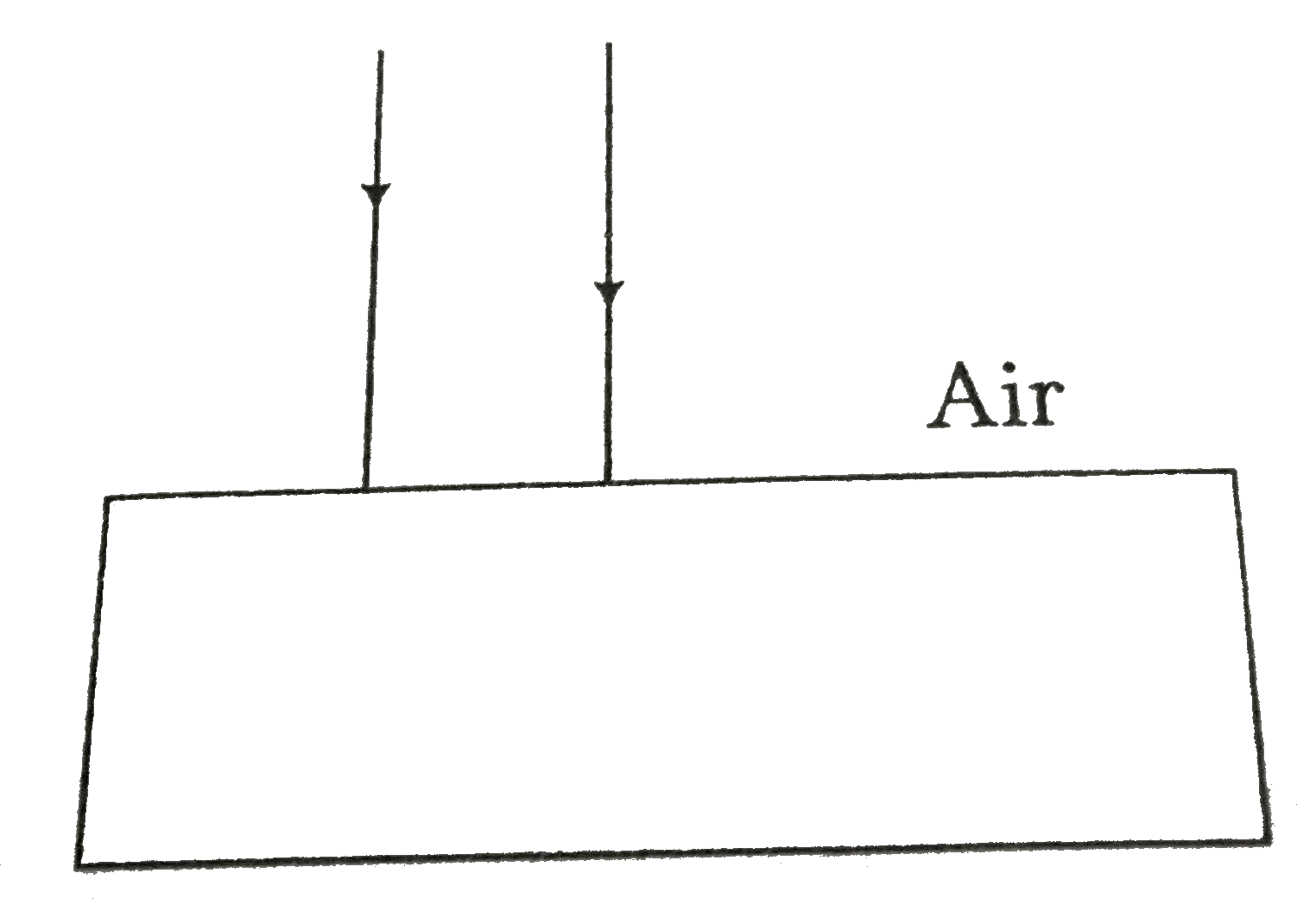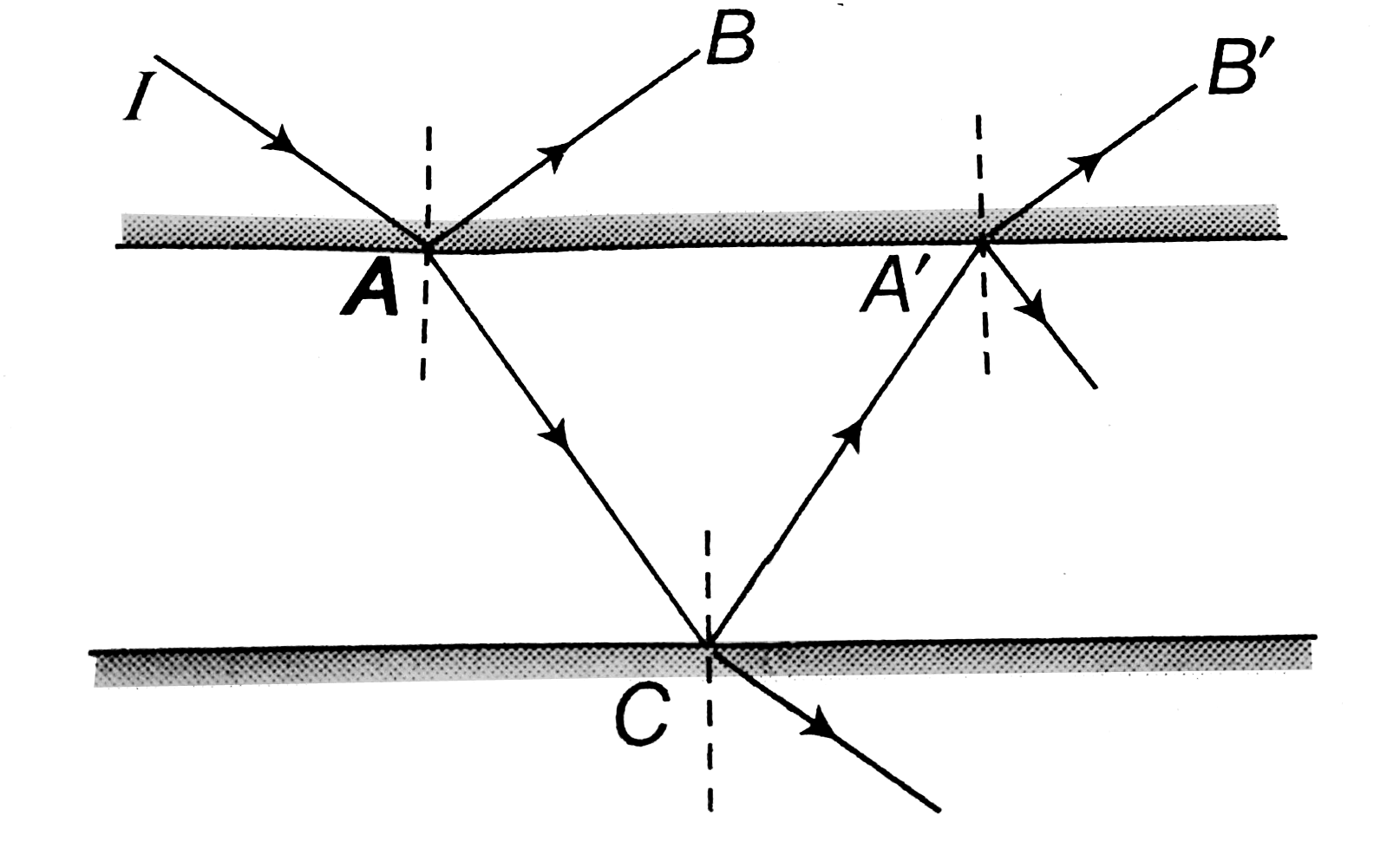A parallel beam of light of intensity I is incident on a glass plate. 25% of light is reflected in any reflection by upper surface and 50% of light is reflected by any reflection from lower surface. Rest is refracted The ratio of maximum to minimum intensity in interference region of reflected rays is

⎛⎜ ⎜⎝12+√3812−√38⎞⎟ ⎟⎠2
⎛⎜ ⎜⎝14+√3812−√38⎞⎟ ⎟⎠2
58
85
The correct Answer is:A
NA
Topper's Solved these Questions
- INTERFERENCE AND DIFFRACTIONBOOK - TARGET PUBLICATIONCHAPTER - INTERFERENCE AND DIFFRACTIONEXERCISE - EVALUATION TEST
20 Videos
- INTERFERENCE AND DIFFRACTIONBOOK - TARGET PUBLICATIONCHAPTER - INTERFERENCE AND DIFFRACTIONEXERCISE - CRITICAL THINKING
72 Videos
- GRAVITATIONBOOK - TARGET PUBLICATIONCHAPTER - GRAVITATIONEXERCISE - EVALUATION TEST
24 Videos
- KINETIC THEORY OF GASES AND RADIATION BOOK - TARGET PUBLICATIONCHAPTER - KINETIC THEORY OF GASES AND RADIATION EXERCISE - Evaluation test
18 Videos
Similar Questions
A narrow monochromatic beam of light of intensity I is incident on a glass plate. Another identical glass plate is kept close to the first one and parallel to it. Each plate reflects 25% of the incident light and transmits the remaining. Calculate the ratio of minimum and maximum intensity in the interference pattern fromed by two beams obtained after reflection from each plate.
View SolutionReflection Of light and Refraction at plane surface
View Solution
Knowledge Check
A ray of light of intensity I is incident on a parallel glass slab at a point A as show. It undergoes partial reflection and refraction. At each reflaction 25% of incident energy is reflected. The rays AB and A'B' undergo interference. The ratio Imax/Imin is
 A4:1B8:1C7:1D49:1
A4:1B8:1C7:1D49:1A light ray is incident on a glass slab, it is partially reflected and partially transmitted. Then the reflected ray is
ACompletely polarised and highly intenseBPartially polarised and poorly intenseCPartially polarised and highly intenseDCompletely polarised and poorly intenseLight of intensity 50W/m2 is incident on a arae of 1m2 in such a way that 25% of light is reflected back. Find the force exerted by light on surface if light incident perpendicularly
A10.8×10−8NB15.8×10−8NC20.8×10−8ND25.8×10−8N
A parallel beam of light is incident normally on a plane surface absorbing 40% of the light and reflecting the rest. If the incident beam carries 60 W of power, the force exerted by it on the surface is
View SolutionA parallel beam of light is incident normally on a plane surface absorbing 40% of the light and reflecting the rest. If the incident beam carries 60 W of power, the force exerted by it on the surface is
View SolutionA parallel beam of light is incident normally on a plane surface absorbing 40% of the light and reflecting the rest. If the incident beamm carries 60 W of power, the force exerted by it on the surface is
View SolutionIf a parallel beam of light having intensity I is incident normally on a perfectly reflecting surface, the force exerted on the surface, equal F. When the surface is held at an angle θ, the force is
View SolutionA ray of light intensity I is incident on a parallel glass-slab at a point A as shown in figure. It undergoes partial reflection and refraction. At each reflection 25% of incident energy is reflected. The rays AB and A′B′ undergo interference. The ratio Imax/Imin is

View Solution
